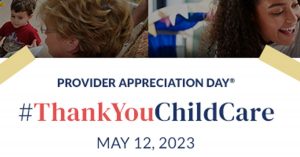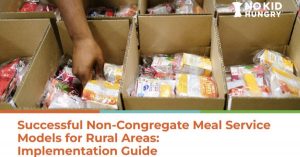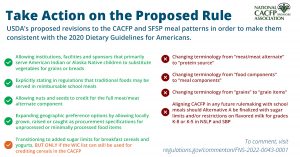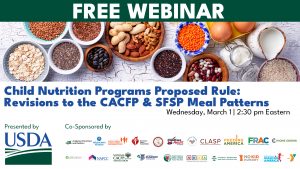Posts Tagged ‘sfsp’
National Asian American Pacific Islander (AAPI) Month
It’s Asian American Pacific Islander Month! Discover AAPI inspired recipes and learn more about Qigong, a traditional Chinese practice for movement.
Read MoreProvider Appreciation Day
This year, provider appreciation day is May 12 and is all about saying “thank you“ to America’s child care providers. A simple gesture can mean the world to the workforce that keeps the rest of the workforce going. Our partners at Child Care Aware of America make it easy to say #ThankYouChildCare with their toolkit of resources in English and Spanish, and a few easy activities that make a provider feel appreciated.
Read MoreQ&A: Summer 2023 Non-Congregate Meal Service in Rural Areas
USDA released a memo with a second set of questions and answers on the rural non-congregate summer meals option established through the Consolidated Appropriations Act, 2023. The memorandum addresses the following topics: State Agency approval of non-congregate meal service; sponsors, site, and participant eligibility; meal service; monitoring; reporting; and general/miscellaneous guidance.
Read MoreOn-site/Off-site Monitoring Guidance (SFSP)
USDA has released guidance regarding on-site and off-site strategies and options for oversight and monitoring of the Summer Food Service Program.
Read MoreSuccessful Non-Congregate Meal Service Models for Rural Areas
In approved states beginning summer 2023, Summer Food Service Program (SFSP) and NSLP Seamless Summer Option (SSO) sponsors can operate non-congregate programs in rural communities without access to a congregate meal site. Our partners at No Kid Hungry have created a resource that outlines effective models for non-congregate meal service. Use their guide to find strategies and tactics to execute a successful non-congregate summer meals program in your rural community.
Read MoreComment Requested – Revisions to Meal Patterns Consistent with the 2020 DGAs
Based on feedback from our members, NCA has developed model comments to help you provide feedback to USDA about the Proposed Rule regarding changes to meal patterns to be consistent with the 2020 DGAs.
Read MoreGuidance on Performance Standards, Budgets, and Management Plans in the Summer Food Service Program
In September 2022, FNS published the Final Rule: Streamlining Program Requirements and Improving Integrity in the SFSP. Compliance with the provisions of the rule must begin by May 1, 2023. The USDA released a memo to provide guidance for state agencies and program operators on SFSP performance standards, budgets, and management plans which were aligned with other child nutrition programs through the final rule.
Read MoreConsolidated Appropriations Act, 2023: Effect on Child Nutrition Programs
Summer EBT will provide EBT benefits on an ongoing basis to low-income children during the summer months to ensure continued access to meals and snacks when school is not in session. For 2024, benefits are an amount equal to $40 per month per eligible child during the summer operational period.
Read MoreImplementation Guidance: Summer 2023 Non-Congregate Meal Service in Rural Areas
The Consolidated Appropriations Act, 2023, established a permanent non-congregate meal service option for rural areas with no congregate meal service available. This memorandum provides guidance on the administration and operation of non-congregate meal service in rural areas during summer 2023 for the SFSP.
Read MoreFree Webinar Child Nutrition Programs Proposed Rule: Revisions to the CACFP and SFSP Meal Patterns
The USDA released a document with proposed revisions to Child Nutrition Programs’ meal patterns in order to be consistent with the 2020-2025 Dietary Guidelines for Americans. We’re partnering with USDA and other organizations to host a webinar on how these proposed changes would impact the CACFP and SFSP. After the webinar, we’ll be hosting our own Q&A session for our NCA members and their feedback.
Read More









